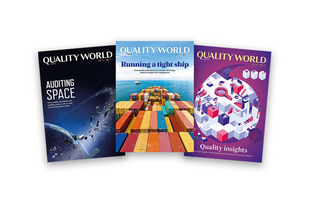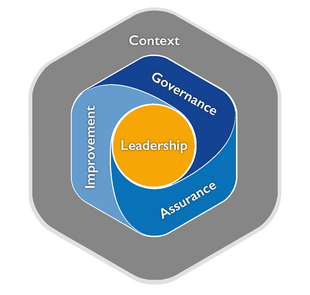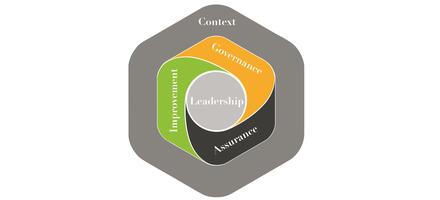
The four skills you need to achieve your career goals
Progress indicator

The CQI went behind the scenes at some of the profession’s top employers to reveal the skills you need to achieve your career aspirations
1. Learn to lead
Leadership is one of the crucial tenets of the CQI Competency Framework. Every quality professional should develop this behaviour irrespective of their position in their organistation.
Refining your leadership skills is not only vital for proving you can take on more responsibility and develop in your role, it is also crucial for ensuring the rest of the organisation understands the value of your work and the work of the profession.
In the CQI’s latest Member Survey more than 60 per cent of members said they wanted to learn more about this competence, illustrating the importance of this skill for quality professionals across the globe.
Christopher Platt, head of quality at defence giant Lockheed Martin, revealed leadership skills are one of the top competencies he looks for when hiring a new member of his team and calls for more quality professionals to show ‘solid demonstrable evidence’ of leadership behaviour.
‘As you progress and want to make the step into quality management roles the management side becomes arguably more important than the technical skills,’ he says. ‘I need a level of competence on the detail and credibility of my team but management and leadership take up a large part of my time. If you can’t develop those management leadership skills, you’re going to have difficulty punching for those good programme management jobs.’
One organisation illustrating the importance of leadership is innovative materials manufacturer Saint-Gobain. Last year the organisation began a campaign for ‘quality champions’, encouraging volunteers to help different business functions ensure quality in their work.
The criteria for the champions were based on the quality coach, quality motivator and quality collaborator roles described in the Competency Framework. As a result the quality team became more aware of their knowledge and competency gaps and boosted their standing in the business.
‘Now we are seen as a solutions-based improvement team, not the audit and inspection police,’ says quality manager Kevin Jordan, CQP MCQI. ‘We hold more credibility in the business than ever before and are valued members of the multiple, strategic improvement projects. As a team we are also more aware of our competency gaps and we now know how to tailor our future learning requirements using the framework.’
2. Engage and influence
Communication skills are important for ensuring the quality message is spread throughout the organisation. Employers look for candidates with the ability to influence their peers as this heightens engagement with the quality strategy across the business and helps other business functions to understand the importance of the profession.
When quality teams influence the wider workforce they are able to achieve immense change. At BAE Naval Ships the quality team worked hard to engage 4,000 members of staff by creating a Quality Maturity Model (QMM), including coaching, training and a communications programme. As a result they have improved their ships from design to completion, reduced rework and impacted the bottom line by cutting the cost of quality.
‘Quality is not black and white, it’s an ongoing process and you have to bend and twist and be flexible working with people,’ says quality improvement manager Willie Smith. ‘It was hard to win over people initially but we succeeded and are now starting to see real benefits.’
However, according to Tony Blanch, business improvement director at Costain, discovering candidates with these engagement skills is rare. ‘I think the biggest challenge is trying to find people who are influencers, who are leaders within the quality profession,’ he says.
‘You have to communicate in an engaging manner, in a way that makes people want to listen and people want to understand. I’m also looking for those who are able to listen and relay information in a way that people can understand – the influencing skills.’
For Blanch, a talented communicator with technical prowess is a winning combination and an individual who can showcase these skills is an asset for any organisation. ‘It’s all well and good doing the audit and saying things aren’t right but if you cannnot influence people to change, and say it in a way that makes people want to make that change then your improvements are not going to go very far or add value,’ he reveals.
3. Understand the context of your organisation
Quality professionals have to work across the entire organisation to make valuable improvements so a holistic understanding of the business is vital.
Neil Khandke, global director of quality and ethics at health and wellbeing enterprise Walgreen Boots Alliance, reveals he looks for quality professionals who will be key players in achieving growth in the organisation.
He says: ‘If we reflect on the CQI Competency Framework, previous recruitment would take us to roles and individuals who excelled in process and product expertise, compliance and risk management. Now we need quality professionals in line with the vision of the CQI.
‘Quality today is moving beyond the traditional compliance function and is seen as an enabler of business growth. Often our quality professionals are in a unique position in a business like ours to provide a holistic balanced view of the risks and opportunities in the organisation. This requires individuals with a desire to work not only cross functionally with business partners but also across continents and associated cultures.
‘You need to have a thoughtful, open and global mindset and a real curiosity about how the different parts of the organisation work along with a passion to understand what consumer relevant quality means.’
Telecommunications and internet company BT Ireland made this their goal in 2015. The company agreed a quality charter with their teams, enabling them to use quality methods and tools to solve every day challenges for others in the organisation. In turn they hope to gain case studies to illustrate the importance of quality across the company.
‘If we succeed in this we will make sure quality is not just fundamental to the way the organisation works, but also integral to how each and every one of our people instinctively think and act,’ says Clare Stelfox, quality, sustainability and governance lead.
4. Push yourself and your team
One of the best ways to achieve your career aspirations is to set yourself goals and work with your organisation to achieve them. This will help you to improve your knowledge, skills and experience and evolve with the business while achieving your continuing professional development (CPD) goals.
‘I don't believe there is a skills gap,’ says Platt. ‘There are some brilliant candidates out there I have been absolutely blown away by the quality of people coming in at Lockheed Martin. I think individuals can push themselves forward. However, equally I think it’s up to people in more senior positions.
‘So within my team the most significant change has been to invest heavily in our people. We target people who might be thinking of leaving because the longer we keep them the better they become at the job and the better their self-confidence becomes.
‘We can also push opportunities and courses. We’ve put a whole load of courses out to the team – many of them with the CQI – but equally it’s about looking out for opportunities.
‘Although we can put the opportunities forwards, it takes the individual to delve in. I can give the example of myself looking towards head of quality and looking to push myself forward. Taking a chance and having bit of belief in yourself goes a long way.’
Words: Natasha Cowan
Learn the skills employers want with CQI and IRCA Certified Training.
Member only

This article is free to access for a limited time only. Only CQI and IRCA members receive access to all content.
CQI and IRCA Certified Training

Certified training courses on quality and auditing topics delivered by our global network of Approved Training Partners.
Quality Careers Hub

Exclusively for members, the CQI’s Quality Careers Hub is designed for every career stage. So whether you’re just starting out, ready to move on or up, or looking to build on your experience, there are many ways to progress.
Quality Careers Hub

Exclusively for members, the CQI’s Quality Careers Hub is designed for every career stage. So whether you’re just starting out, ready to move on or up, or looking to build on your experience, there are many ways to progress.
The Profession Map

Your route to success - equipping modern quality leaders to meet evolving business demands.

